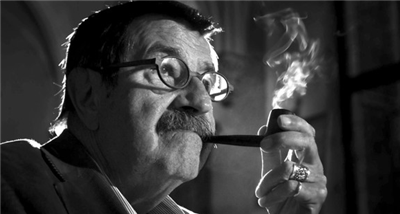(单词翻译:单击)
Günter Grass, the German author who has died at a clinic in Lübeck aged 87, won the 1999 Nobel Prize for Literature and was known for his critical view of Germany’s Nazi past, developed in imaginative novels including The Tin Drum.
德国作家君特•格拉斯(Günter Grass)在吕贝克(Lübeck)的一家诊所去世,享年87岁。他获得过1999年的诺贝尔文学奖(Nobel Prize for Literature),以批判德国的纳粹历史而闻名,这些批判性观点在《铁皮鼓》(The Tin Drum)等富于想象力的小说中都有体现。
Hubert Winkels, the literary editor of German public radio, said that while the postwar years had produced other great writers in Germany, Grass was “unique” in establishing himself as a figure that spanned culture, politics and society.
德国公共广播电台文学编辑胡贝特•温克尔斯(Hubert Winkels)说,虽然战后德国也出现了其他伟大的作家,但格拉斯“独一无二的”地方在于,他是一位在文化、政治和社会领域都确立了影响力的人物。

Mr Winkels told the FT: “He was engaged not only on German but on worldwide issues such as disarmament. Nobody can do this any more. The worlds of culture and politics and so on have become too separate.”
温克尔斯对英国《金融时报》表示:“他不仅参与德国的事务,而且参与裁军等全球性议题。再也没有人能做到这一点。文化世界与政治等其他领域已经非常割裂了。”
His reputation as a moral authority suffered in 2006 when he revealed that he had, as a 17-year-old conscript, served briefly in a tank division of the Waffen SS, a military formation of the Nazi party. Grass had for decades maintained he had only served in flak units.
2006年,格拉斯作为道德权威的声誉受到打击。当时,他透露自己在17岁时曾应征入伍,在武装党卫军(Waffen SS,纳粹领导下的一支军事部队)的一个装甲师短暂服役。此前几十年里格拉斯一直坚称,他只在高炮部队服役过。
Grass was criticised not so much for joining the Waffen SS, which many young men were forced to do at the end of the second world war, but for preserving his public silence on it for so long. He explained that only late in the day had he found “the literary form” to write about the experience, in a memoir entitled Peeling the Onion.
人们批评格拉斯主要不是因为他曾加入武装党卫军(二战快结束时许多小伙子都被强招入伍),而是因为他在这件事上如此长时间地对公众保持沉默。他在名为《剥洋葱》(Peeling the Onion)的回忆录中解释说,他花了很长时间才找到书写那段经历的“文学形式”。
His critics charged him with hypocrisy, asking how he could have been so critical of other Germans’ reckoning with the Nazi era when his own was flawed or, at best, incomplete.
格拉斯的批评者指责他虚伪,质问他如何能在自身的反思有缺陷——或者说好听点,不全面——的情况下,如此激烈地批评其他德国人对纳粹时代的反思。
However, the controversy was yesterday largely set aside, with tributes emphasising Grass’s literary achievements. Norbert Lammert, the parliamentary speaker, said: “With Günter Grass we are losing not only one of the most significant writers in the German language but also an engaged citizen who repeatedly took public positions.”
不过,这一争议昨日基本上未被提及,悼念活动主要强调了格拉斯的文学成就。德国联邦议院议长诺贝特•拉默特(Norbert Lammert)表示:“君特•格拉斯的辞世让我们不仅失去了一位极其重要的德语作家,也失去了一位不断公开表达立场、热衷参与政治的公民。”
Imre Kertesz, a Hungarian-born Jewish writer and Holocaust concentration camp survivor who also won a literature Nobel, said: “We did not deal with the same subjects but we were friends and we had mutual respect.”
生于匈牙利的犹太作家、大屠杀(Holocaust)集中营的幸存者、同为诺贝尔文学奖得主的凯尔泰斯•伊姆雷(Kertész Imre)说:“虽然我们不曾涉猎同样的题材,但我们是朋友,我们相互尊重。”
A discordant note was struck in Israel where national radio said Grass had gone too far in his criticism of the Jewish state. In 2012, Grass was banned from visiting the country after publishing a poem called “What Must Be Said”, in which he suggested that Israel’s nuclear arsenal was a threat to Iran.
但以色列方面却传出了一个不和谐的音符,以色列国家广播电台表示,格拉斯对这个犹太国家的批评太过头了。2012年,以色列禁止格拉斯访问该国,因为此前他发表了一首题为《必须说点什么》(What Must Be Said)的诗,并在其中暗示以色列的核武库对伊朗构成了威胁。


